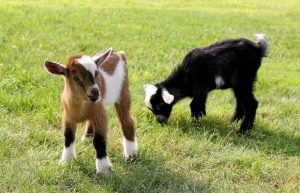
What You Need to Know About Feeding Grain to Baby Goats
As grazing animals, the diet of a goat should consist mainly of shrubs, weeds, grass, and other vegetation. You can also feed grain to your goats to help sustain their diets and ensure they are getting the sugars and nutrients they need to stay healthy. While goats shouldn’t be fed a lot of grain, it can be used to help them keep their weight and produce more energy for growing and pregnant goats.
When do baby goats start eating grain? Baby goats can start eating small amounts of grain as early as 1 week of age to help develop their digestive system. By 4 – 8 weeks of age, baby goats will be weaned from their mothers and be completely reliant on solid foods.
The development within the first few weeks of a goat’s life is vital to their health and success as adults. Understanding goats and how they develop can help you take better care of them and see that their needs are met. In this article, I’ll cover the development of young goats and how feeding grain works into it.
Why You Should Feed Baby Goats Grain
One of the main reasons you should start feeding grain to baby goats as early as one week of age is to help develop their rumen, which is part of their digestive system. Goats are ruminants, meaning that their stomach has four different compartments. The first section of the stomach is called the rumen.
The rumen partially digests food before the food is regurgitated to be chewed again. This is called “chewing the cud.” This enables the goat to extract as much nutrients from the food as possible.
The rumen is a vital part of the digestive system that must properly develop for the goat to function. Feeding baby goats a handful of grain at feeding time can help the rumen start digesting more solid foods.
How Much Grain Should You Give to Baby Goats?
When it comes to feeding baby goats grain, it’s important to allow for the development of the digestive system, specifically the rumen. If you feed a baby goat a bunch of grain all at once, the goat can become severely sick since it’s not used to digesting solid foods. Too much grain can be bad for any goat since they are designed to eat mostly grass, shrubs, and weeds.
You should transition your baby goats to solid foods and grain gradually. Start off by providing about a handful of grain to the baby goat at one week of age. From there, you can start gradually increasing the amount of grain until you’re feeding about 1/2 cup per day. The baby goat should be reliant on solid foods by about 4 weeks of age.
By the time the goats are adults, you can feed as much at 1 cup of grain per day; however, it’s important to remember that the goat’s diet should be made up of primarily of forage, not grain.
What Type of Grain Should You Feed Baby Goats?
When it comes to feeding grain to you baby goats, you can start off by feeding them a goat starter grain. Starter grains a specifically designed for young livestock to aid them in growth and development. Goat starter grain is particularly high in protein, and you should aim to feed a starter grain that has 16 – 18% protein. Protein will provide your goat with an energy source that will fuel development.
You can feed goat starter grain until your goats are about 16 weeks old, then you can gradually transition them to the grain you provide your adult goats. If you need to know what to feed your goats once they’re past 16 weeks old, I recommend whole grain, which contains oats, cracked corn, flaxseed, alfalfa, beet pulp, and sunflower seeds. The reason I recommend whole grain specifically is because it is more of a natural feed that doesn’t contain processed and sugary food.
When Do Baby Goats Start Eating Grass?
 Besides eating small portions of grain each day, a goat’s diet will heavily rely on forage, which can be grass, hay, shrubs, weeds, bark, and twigs. Since forage is such a big part of a goat’s diet, you may be wondering when exactly do baby goats start eating grass?
Besides eating small portions of grain each day, a goat’s diet will heavily rely on forage, which can be grass, hay, shrubs, weeds, bark, and twigs. Since forage is such a big part of a goat’s diet, you may be wondering when exactly do baby goats start eating grass?
Baby goats will usually start to pick at grass and hay at 2 – 3 weeks old. At first, they may nibble at it then spit it out. Some babies may start eating vegetation more quickly than others; it usually just depends on the goat. It’s best to start your baby goats off on hay, as it is easier to digest than grass. Alfalfa hay provides a higher quantity of protein and minerals than other hays, so it’s a good choice to feed to your baby goats.
When Should You Wean a Baby Goat From Its Mother?
For the first few weeks of its life, a baby goat will rely heavily on its mother for comfort and care. Goat milk provides vital nutrients and vitamins that enables the baby goat to develop. Baby goats also imprint on their mothers, meaning that they form a strong attachment to their mother and look to them for care.
Weaning a goat is when you separate a baby goat from its mother at the proper time in order to help the baby goat learn to rely on solid foods instead of its mother’s milk. Weaning will also teach the baby goat to live on its own rather than relying on its mother for care and protection.
Weaning often happens when the baby goat is 4 -8 weeks of age. As the baby goat ages, it will rely more and more on forage and solid foods as well as start to get more comfortable wandering away from its mother. If you notice these behaviors in your baby goats, you know it’s time to wean them.
When Is a Goat’s Rumen Fully Developed?
In the first section, I mentioned how important the development of the rumen, the first compartment of the goat’s stomach, is to the digestive system. The rumen enables the goat to get as much nutrients from their food as they can; if the rumen is under-developed, it can affect the growth of the goat and the ability of the goat to eat and digest food.
The rumen of the goat should be fully developed by 3 months of age. While a baby goat can be fully dependent on solid foods as early as 1 month, the rumen will still be developing and adjusting to a solid food diet during this time. It’s always important to monitor your baby goat to see if they are properly developing and digesting food.
Signs That Your Goat is Having Digestive Issues
Digestive problems can be potentially fatal to goats, so it’s important that you’re able to notice when your goat may be dealing with a sore tummy. Here are some behaviors your goat may exhibit when their stomach isn’t feeling good:
The Goat Will Eat Less
One clear indicator your goat is having a digestive problem is that they won’t want to eat. This can be a sign that the goat is having difficulty digesting the food, or that they may be in pain when they eat. I know that I don’t like to eat food when I have a stomach ache; I guess that goats don’t like to either!
The Goat Will Whine
Goats are very expressive creatures, and they usually wear their feelings on a sleeve. Some goats may actually whine if they are in pain. If you’re goat is bleating excessively, it may mean that their stomach is hurting them. If you wan’t to know more about how goats express themselves, check out my article Goat Affection: 10 Clear Ways Goats Show Affection.
The Goat Will Be Lethargic
A goat that doesn’t feel good often displays the same behavior as a human that doesn’t feel good. I know when I’m feeling sick, I rather lay around all day than get up and do something. If your goat isn’t feeling good, they will be lethargic and won’t have their usual energy. Instead of playing, socializing, and eating, they may be more apt to go off by themselves to lay down.
The Goat’s Side Will Feel Hard
If the goat’s digestive system isn’t contracting, food and nutrients won’t be able to pass through the body. One way you can tell if the rumen isn’t contracting is that the goat’s side will feel hard to the touch and may stick out more than normal. In some instances, you may see the muscle spasm as it continues to hold the tension.
If notice any of these signs in your goat, the best thing to do is to call a veterinarian and get guidance on how you should handle the situation. Raising goats can be rewarding and enjoyable, but it also takes hard work and dedication. I have many articles about taking care of goats. If you’re looking for reading material, check out the articles below!
